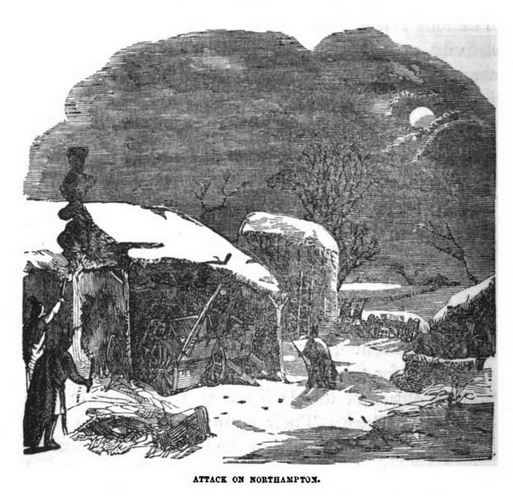Edited by Dane Larsen
Now the Indians gather their forces to go against Northampton.1 Over
night one went about yelling and hooting to give notice of the design.2
Whereupon they fell to boiling of ground nuts, and parching of corn (as
many as had it) for their provision; and in the morning away they went.

During my abode in this place, Philip3 spake4 to me to make a shirt for
his boy, which I did, for which he gave me a shilling.5 I offered the
money to my master, but he bade me keep it; and with it I bought a piece
of horse flesh. Afterwards he asked me to make a cap for his boy, for
which he invited me to dinner. I went, and he gave me a pancake,6 about
as big as two fingers. It was made of parched wheat, beaten, and fried
in bear’s grease, but I thought I never tasted pleasanter meat in my
life. There was a squaw7 who spake to me to make a shirt for her sannup,8
for which she gave me a piece of bear. Another asked me to knit a pair
of stockings, for which she gave me a quart of peas. I boiled my peas
and bear together, and invited my master and mistress to dinner; but the
proud gossip, because I served them both in one dish, would eat nothing,
except one bit that he gave her upon the point of his knife. Hearing
that my son was come to this place, I went to see him, and found him
lying flat upon the ground. I asked him how he could sleep so? He
answered me that he was not asleep, but at prayer; and lay so, that they
might not observe what he was doing. I pray God he may remember these
things now he is returned in safety. At this place (the sun now getting
higher) what with the beams and heat of the sun, and the smoke of the
wigwams,9 I thought I should have been blind. I could scarce discern one
wigwam from another. There was here one Mary Thurston of Medfield,10 who
seeing how it was with me, lent me a hat to wear; but as soon as I was
gone, the squaw (who owned that Mary Thurston) came running after me,
and got it away again. Here was the squaw that gave me one spoonful
of meal. I put it in my pocket to keep it safe. Yet notwithstanding,
somebody stole it, but put five Indian corns11 in the room of it; which
corns were the greatest provisions I had in my travel for one day.12
The Indians returning from Northampton, brought with them some horses,
and sheep, and other things which they had taken; I desired them that
they would carry me to Albany upon one of those horses, and sell me for
powder: for so they had sometimes discoursed. I was utterly hopeless of
getting home on foot, the way that I came. I could hardly bear to think
of the many weary steps I had taken, to come to this place.
Thanks to Project Gutenberg for providing the digitized version of this text free of charge. Without their generosity, this project would not be possible.
https://historyofmassachusetts.org/what-was-king-philips-war/ The raid on Northampton occurred February 14, 1667. While the section of text from the Pictorial History of King Philip’s War suggests that Metacom’s forces suffered considerable losses, Rowlandson does not give comment. ↩
“design, n.”. OED Online. September 2020. Oxford University Press. A plan to attack someone or something; an inclination or plot to gain possession of something, esp. in a cunning or devious manner. ↩
Kathleen J. Bragdon. The Columbia Guide to American Indians of the Northeast. (New York: Columbia University Press, 2001), 135. King Phillip, also known as Metacom or Metacomet, led indigenous resistance against English colonists during King Phillip’s War 1775-1776. ↩
From the Middle English spak, being the simple past tense of speak. ↩
“shilling, n.”. OED Online. September 2020. Oxford University Press. A former English money of account, from the Norman Conquest of the value of 12d. or 1/ 20 of a pound sterling. ↩
https://www.youtube.com/watch?v=XgNuPXIIvC8 Journey of the Journey Cake – Any Grain Will Do. Townsends’s focus is the 18th Century colonial experience, but the process of making journey, or johnnie, cakes, is similar to Rowlandson’s limited ingredient cake. ↩
English sexual slur for an Indigenous woman. ↩
“sannup, n.”. OED Online. September 2020. Oxford University Press. In this context, the woman’s “sannup” is her husband. ↩
A dome shaped housing construction utilized by indigenous peoples. ↩
https://www.masshist.org/beehiveblog/2013/02/mary-rowlandsons-dolefullest-day/ A young girl who befell a similar fate to Rowlandson when her village, Medfield, was raided by Metacom’s forces. ↩
https://www.history.com/news/indian-corn-a-fall-favorite. Also known as Flint Corn. ↩
Samantha Woodington, “‘The Indians gaping before us’: Anxieties of Consumption in Mary White Rowlandson’s Sovereignty and Goodness of God,” Literature in English, North America Commons (2016): 21-22. This remove is a good example of Rowlandson becoming an “active agent” within the indigenous economy; although this sentence suggests she is unable or unwilling to see it that way. As Woodington argues, Rowlandson, in many instances is able to trade her “Englishness” for foods and goods, as well as for permissions and limited freedom. ↩
